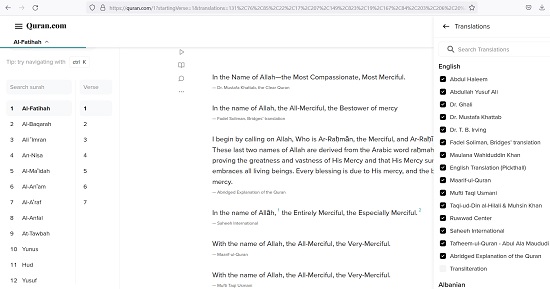Recently I was in a mosque listening to the imam’s teaching. He said something very misleading. What he said I have heard many times before – from my good friends. And perhaps you also have heard this and it has raised questions in your mind. So let us consider it.
The imam said that there are so many different versions of the Bible (al kitab). In the English language, you can get the King James Version, New International Version, New American Standard Version, New English Version etc. Then the imam said that since there are so many different versions this shows that the Bible has been corrupted. Or at least we cannot know the ‘true’ one. There are these different versions. But this has nothing to do with the question of the corruption of the Bible. It has nothing to do with whether these actually are different Bibles. In fact, there is only one Bible/Kitab.
The New International Version, for example, refers to a certain translation from the original Greek (Injil) and Hebrew (Taurat & Zabur) into English. The New American Standard Version is another translation into English but from the same Greek and Hebrew text.
The Same Situation: English Translations of Holy Qur’an
The same situation exists with the Qur’an. I usually use the Yusuf Ali translation but I also sometimes use the Pickthall translation. Pickthall translated from the same Arabic Qur’an that Yusuf Ali used. But his choice of English words in his translation is different. Thus they are different translations. But no one, not a Christian, a Jew, or even an atheist says that different translations of the Qur’an into English (Pickthall’s and Yusuf Ali’s) show that there are ‘different’ Qur’ans or that the Holy Qur’an is corrupted.

In the same way, there is a Greek text of the Injil (see it here). There is a Hebrew text for the Taurat and Zabur (see it here). But most people do not read these languages. So various translations are available in English (and other languages) so that they can understand its message in their native language.
Since so many today read English a great number of English translations exist. But what about the errors involved in translation? Does the fact that there are different translations show that it is impossible to accurately translate from the original? Due to the vast Greek scholarship, translators can precisely translate the original thoughts and words from Greek. In fact, the different modern versions show this.
An Example from Original Greek
For example, here is a verse from the New Testament, taken from 1 Timothy 2:5, in the original Greek.
εις γαρ θεος εις και μεσιτης θεου και ανθρωπων ανθρωπος χριστος ιησους
1 Timothy 2:5
Here are some popular translations of this verse.
For there is one God and one mediator between God and mankind, the man Christ Jesus, New International Version
For there is one God, and one mediator between God and men, the man Christ Jesus; King James Version
For there is one God, and one mediator also between God and men, the man Christ Jesus, New American Standard Version
As you can see for yourself they are very close in their translation – differing by only a couple of words. They say exactly the same thing with only slightly different word usage. This is because there is only one al Kitab/Bible and therefore the translations from it will be very similar. They are not ‘different’ Bibles. It is completely wrong to think that because there are different versions this means that there are different Bibles.
I urge everyone to select a version of al-kitab/Bible in their own native language to read. It is well worth the effort. Here is a good place to start.